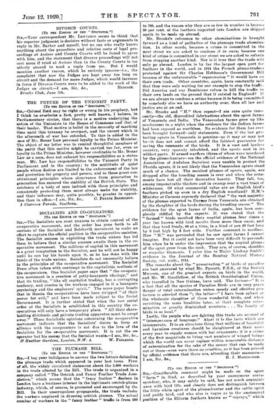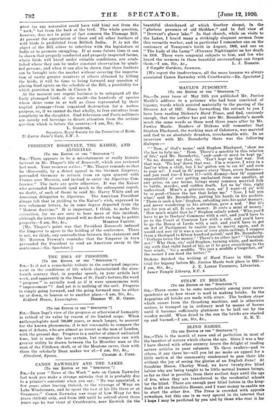(To THE Emilie or rim "Seeceraoa "1
Sue--Considerable comment might be made on the egret "farm** in Sind, as described by your anonymous corre- spondent, who, it may safely he said, has not much acquaint- ance with bird life, and clearly does not distinguish between the little white egret of the plume-hunter and the cattle egret and paddy bird, and who also is vague as to the anatomical position of the flliform feathers known as " ospreys," which grow (as any naturalist could have told him) not from the " neck," but from the back of the bird. The whole question, however, does not in point of fact concern the Plumage Bill. At present the exportation of these and all other feathers of wild birds is prohibited from British India. It is not the object of the Bill either to interfere with the legislature of India or to promote smuggling. If at some future time it can be shown that properly conducted and properly inspected farms, where birds will breed under suitable conditions, are estab- lished where they can he under constant observation by quali- fied persons, and when it can also be shown that these feathers can be brought into the market without covering the importa- tion of vastly greater numbers of others obtained by killing the birds, it will be time to bring forward any question of placing Sind egrets on the schedule of the Bill, a possibility for which provision is made in Clause 3.
At the moment our urgent business is to safeguard all the finely plumaged birds of the world—the hundreds of species whose skins come in as well as those represented by their nuptial plumage—from organized destruction for a useless purpose, or, if we cannot do that wholly, to free ourselves from complicity in the slaughter. Sind fishermen and Paris milliners are merely red herrings to divert attention from the serious que-tion which is before the country.—I am, Sir, &c.,
L. GARDINER,
Secretary, Royal Society for the Protection of Birds. 23 Queen Anne's Gate, S.W. 1.







































 Previous page
Previous page